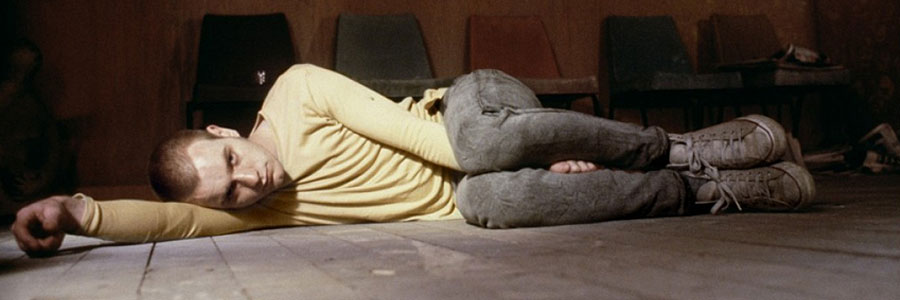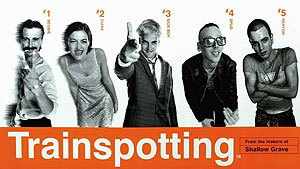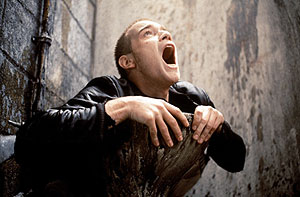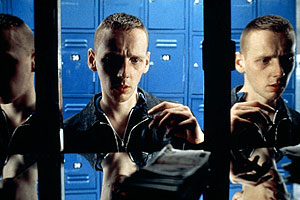
Trainspotting

TRAINSPOTTING (MOVIE)
PolyGram Filmed Entertainment
Original release: February 23rd 1996
Running time: 93 minutes
Director: Danny Boyle
Writers: John Hodge, Irvine Welsh (novel)
Cast: Ewan McGregor, Jonny Lee Miller, Robert Carlyle, Ewen Bremner, Kevin McKidd

Set in Edinburgh in the 90s, Trainspotting follows several friends as they travel through all manner of drugs, predominantly heroin, stopping only to take a long hard look at themselves (to then continue taking more drugs).
Based on the novel by Irvine Welsh of the same name, it’s a depraved, hilarious and stylish film that catalogues the popular culture of the 90s (or, arguably, its counter-culture). As viewers we’re ingratiated into this culture immediately; we see it from all perspectives – the highs, the lows, and the lulls in-between.
The film begs a lot of questions about how we, as viewers, understand the individual, their place in or out of society, and how much of right we have to cast aspersions on each other.
The opening scene sums up the entire film for me: choose life. This is a film about a group of people who are ambivalent to choices. Their choices, or the lack of them, dictate their lives more than they want to admit. They take drugs and indulge in all other physical pleasures, and then they deal with the consequences immediately after; consequences including their general misdemeanours, crimes – both legal and moral – come-downs, and the boredom of sober life.
They have an insatiable lust for life – as the song rightly declares – and it comes at a very specific cost.
In Renton’s first stint of sobriety he finds himself in a quandary: the suppositories he took to ease himself away from heroin have fallen down a toilet. He’s forced to climb into the murky water to retrieve them, or be forced to go through his withdrawal devoid of any support. As he accepts his fate and climbs into the toilet, that lust for life has thrown him as low as he can possibly go. He’s joined his own waste to help stave off the crippling pains of his addiction.

Boyle holds no punches when it comes to how graphic this scene is. We see Renton on the toilet, then climbing into the toilet, and then everything changes as he swims through a deep, clear water to find his suppositories. When he remerges the sheer ugliness of the situation becomes apparent.
As Bauman describes Italo Calvino’s Invisible Cities, the characters of Trainspotting are like the commodities that live on the rubbish pile, the tip. Is it because they’re ugly themselves, or are they ugly because they’ve been outcast? They’ve intentionally not chosen life, and their counter paths lead them to a life of pleasure, which ultimately takes them to the rubbish pile. Have they been thrown away because they’ve chosen this life, or did they decide to throw their lives away? Is it us, the rest of society, that have earmarked them for the tip and decided they don’t belong, which results in their drug taking or vice versa?
The art of the film is that it raises these questions and then teases them throughout the story. To continue with the theme of Bauman, the next point to consider is redundancy:
Ironically, Renton and Spud do as much as they can to remain redundant, removed from the work-force, and reliant on the dole. They’re stuck in a self-sufficient cycle of stealing to feed a drug habit that relinquishes responsibility or ‘boredom’ as Renton calls it. Being redundant is part of the cycle they’re stuck in, and they keep themselves in a state of being perpetually disposable. They go to great lengths to remain disposable and not have to work. So even though they’ve been thrown to the  waste pile, they revel in it; their counter-culture is based on being disposable, because when we enter that stage of no expectations or responsibilities we can give into base pleasures without fear or conscience.
waste pile, they revel in it; their counter-culture is based on being disposable, because when we enter that stage of no expectations or responsibilities we can give into base pleasures without fear or conscience.
As Renton’s creation we have Tommy; the product both directly and indirectly of drug and general sensory addiction. Renton steals Tommy’s pornography which results in Tommy losing his girlfriend, which in turn leads to Tommy taking heroin. Renton’s cast Tommy onto the rubbish pile through his own selfishness, and it’s Tommy who has to live with the consequences of Renton’s actions because by the end of the film, it’s Renton who has come out on top, whilst Tommy is six feet under.
So what can we do with these people? How can we react to their counter culture – do we judge and despise them? It’s hard to, because Danny Boyle’s made this an incredibly cool film. With slick scene transitions, witty dialogue – mainly due to Welsh – and a superb soundtrack these characters are highly likeable. By filling it up to its brim with Lou Reed, Iggy Pop, Pulp, Blur, Bowie, Joy Division and more, the suffering and shame are all easier to swallow.
- Zygmunt Bauman, Wasted Lives: Modernity and its Outcasts (Blackwell Publishing: Cambridge, 2004), p3. ¹
Do they absolve themselves by being charismatic, witty and fond of great music? It becomes cyclical, they become more human and harder to judge, but they incriminate themselves further. A lot of the choices they make could tar them as fundamentally bad people, but it’s hard to know whether we’re in a position to characterise them that way. At the end of the film Renton says himself ‘the truth is, I’m a bad person’ and although that’s the first time he says it, it feels awkward to finally hear him say it. We should surely all agree – but do we?
To return to the idea of the rubbish pile, is it our place to judge them? The ending goes back to the ‘choose life’ speech. The cycle continues which enforces the idea that it isn’t our place to judge them as there will always be more and it is impossible to ever get the full measure of a person. Trainspotting raises more questions than it answers, and the more times you watch it the deeper it gets.

Jack Murphy
Jack is an English Literature student in his early Twenties (The Golden Age!) at the University of Leeds. He insists on saying that he’s originally from Slough, Berkshire which is the setting of Ricky Gervais’ comedy series The Office – and not a day goes by that he’s not reminded of that fact… Irrespective of being mocked for it, Jack still is, and will most likely remain, a big Gervais fan.
And he sure knows how to spend his time. Having subscribed to a well known DVD delivery service for the past three years, Jack spends half of his days watching DVDs – and the other half on catch-up websites watching TV programmes.
© 2022 STATIC MASS EMPORIUM . All Rights Reserved. Powered by METATEMPUS | creative.timeless.personal. | DISCLAIMER, TERMS & CONDITIONS
HOME | ABOUT | CONTACT | TWITTER | GOOGLE+ | FACEBOOK | TUMBLR | YOUTUBE | RSS FEED
CINEMA REVIEWS | BLU-RAY & DVD | THE EMPORIUM | DOCUMENTARIES | WORLD CINEMA | CULT MOVIES | INDIAN CINEMA | EARLY CINEMA
MOVIE CLASSICS | DECONSTRUCTING CINEMA | SOUNDTRACKS | INTERVIEWS | THE DIRECTOR’S CHAIR | JAPANESE CINEMA





